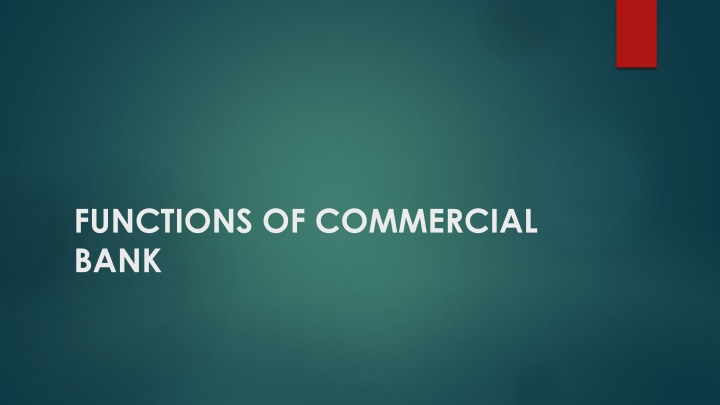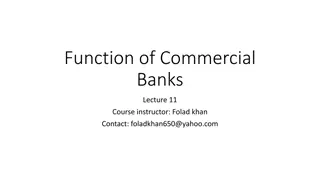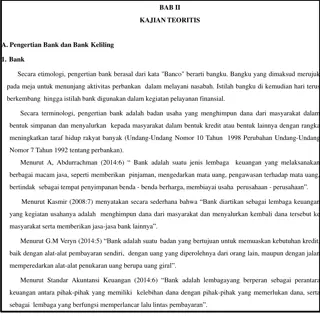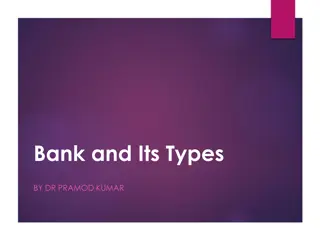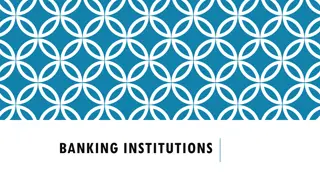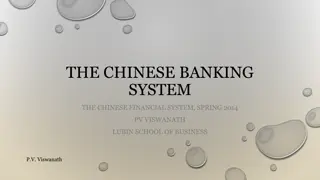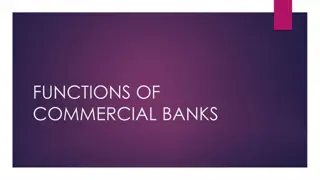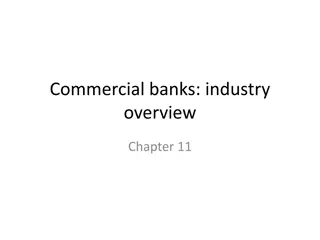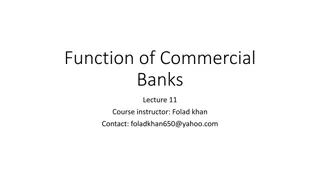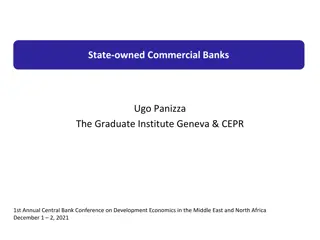Functions of Commercial Banks
Commercial banks perform primary functions like accepting deposits, offering various deposit accounts, advancing loans for productive purposes, creating credit by circulating demand deposits, and providing indirect credit to governments. They serve as important financial intermediaries in the economy by managing funds and facilitating economic activities through their services.
Download Presentation

Please find below an Image/Link to download the presentation.
The content on the website is provided AS IS for your information and personal use only. It may not be sold, licensed, or shared on other websites without obtaining consent from the author.If you encounter any issues during the download, it is possible that the publisher has removed the file from their server.
You are allowed to download the files provided on this website for personal or commercial use, subject to the condition that they are used lawfully. All files are the property of their respective owners.
The content on the website is provided AS IS for your information and personal use only. It may not be sold, licensed, or shared on other websites without obtaining consent from the author.
E N D
Presentation Transcript
I. Primary Functions The main functions that commercial banks perform are: Acceptance of Deposits:- Deposits constitute the major source of funds for banks. Hence, the main function of a commercial bank is acceptance of deposits from the public. This function is important because banks mainly depend on the funds deposited with them by the public. The banks collect money from those who have surplus to lend to those who require loans. People can deposit their cash balances in either of the following accounts as per their requirement - 1.
Fixed Deposit Account: Cash is deposited in this account for a fixed period. The depositors can withdraw money only on the expiry of the period for which the deposit has been made. On such deposit, the banks pay higher rate of interest depending on the length of the time period and amount of deposit. Current Deposit Account: In this account a depositor can deposit and withdraw his funds any number of times he like. Businessmen deposit their funds in this account. Generally, no interest is paid by the bank on the Current Deposit Account. Saving Deposit Account: This account is meant for small savings. There is a limit on total weekly withdrawals. Banks pays interest on this account. But the rate of interest is less than rate of interest paid on fixed deposit account. Cheques may be drawn on saving account. Recurring Deposit Account: Under this account a specified amount is deposited every month for a specified period eg. for 12, 24, 36 or 60 months. The amount cannot be withdrawn before the expiry of the given period except under exceptional circumstances. (a) (b) (c) (d)
2. Advancing Loans:- Another primary function of the commercial banks is to advance loans. A certain part of the cash received by the banks as deposits is kept in the reserve and the remaining is given as loan. Banks advance loans mostly for productive purposes against approved security. Banks advance following types of loans- Call money : It is the money lent for a very short period generally from 1 to 14 Days. Such advances are usually made to other banks and financial institutions only. Money at call ensures liquidity. Overdraft: Overdraft means allowing the borrower to over drew his current balance. The drawee has to pay interest on extra amount withdrawn. The amount has to be repaid within short period. Cash Credit: It is also very popular form of advancing loan. Under this system, the bank advances loans to the customer on the basis of his current assets, receivables or fixed assets by hypothecating them in favour of the banker. Discounting of Bills: It is another very popular method of advancing credit. The banks facilitate trade and commerce by discounting bills of exchange. Discounting a bill of exchange means advancing a loan against a promise of repayment in future. Credit to Government: The commercial banks provide indirect credit to the Central Government or state governments by investing in their securities.
3. Creation of Credit: One of the most important functions, which the banking system plays in a modern mixed economy is to create demand deposit and helps in circulating it as medium of exchange. This is also called the credit creation. It has become the most important function of the commercial banks.
4. Cheque System of Payment of Funds: A cheque as a negotiable instrument is the most popular credit instrument used by the customer to make payments. The cheque system was evolved in very early stages of banking and now it has become the main credit instrument in the banking world. Through a cheque, the customer directs the bank to make payment to the payee.
